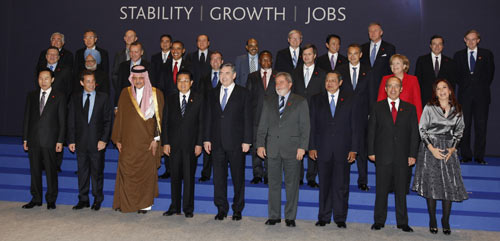
China and the G20
Taking the summit by strategy
Apr 8th 2009 | BEIJING
From The Econom ist print edition
ist print edition
Viewed from home, China and its president, Hu Jintao, had a good G20
THE photograph said it all. Leaders of the world's biggest economies lined up for the cameras before working out ways of tackling the global financial crisis. There in the middle of the front row, in what the Chinese press construed as the most honoured position to the right of the British prime minister, Gordon Brown, was President Hu Jintao of China. The state-controlled media loved the implicit message. China had taken centre stage.
For China the purpose of the G20 summit in London on April 2nd was as much about nudging into place a new alignment of global power as it was about solving the world's economic problems. In recent years its leaders have been happy, along with those of other large developing countries, to be invited to summits of the G8 group of industrialised economies. But it has shown no interest in formal membership, not least for fear of being in a room full of (mostly) rich democracies.
The G20, with more than half of its members from the developing world, is a setting in which China feels far more at ease. The convening last November of the first heads of government meeting of the G
In London China pressed that advantage most visibly with France, which during the past year has been singled out for opprobrium by Chinese nationalists. Before the G20 gathering, China had not scheduled a meeting between Mr Hu and his French counterpart, Nicolas Sarkozy, even though Mr Hu was to hold bilateral talks with other world leaders, including his first encounter with Barack Obama.
Mr Sarkozy's offence had been to meet the Dalai Lama last December. This was the last straw for China after unruly protests by Tibet supporters against an Olympic torch relay through Paris in April 2008 and a threat (unfulfilled) by Mr Sarkozy the previous month that he might boycott the opening ceremony of the Beijing Olympics in August 2008 because of Chinese behaviour in Tibet. China responded to his meeting with the Dalai Lama by aborting a summit with European Union leaders due to be hosted by France. It is now to be held in late May in the Czech Republic, which has taken over the rotating EU presidency.
Mr Hu's speech to the G20 was entitled “Co-operating hand-in-hand, pulling together in times of trouble”. But it was only after France had agreed to issue an unusual joint statement with China, setting out the French position on Tibet, that Mr Hu arranged a separate meeting with Mr Sarkozy in London. In the statement, France said it did not support Tibetan independence in “any form” and that it regarded Tibet as an “inseparable” part of China. It fell short of a promise not to meet the Dalai Lama again, but China was clearly pleased by such a formal, explicit rejection of Tibetan independence by a Western power.
Mr Sarkozy, it appears, did not cave in entirely to Mr Hu. During the summit itself the two leaders sparred over whether the G20 should publish a blacklist of tax havens. Mr Hu objected to the idea (apparently fearing that Hong Kong and Macau might end up being tarred). In the end, Mr Obama took them aside separately and got them to agree that the G20 should merely “note” a list of such havens published by the Organisation for Economic Co-operation and Development. The list did not name the two Chinese territories.
In the build-up to the G20 meeting, Chinese officials had been unusually forthright about the new economic order they wished to see. The governor of the China's central bank, Zhou Xiaochuan, had suggested the use of the IMF's Special Drawing Rights as a new international reserve currency to replace the dollar. He had also pointed out China's “superior system advantage” when it came to making prompt and effective responses to the financial crisis. At the G20 Mr Hu boasted of the currency swaps totalling 650 billion yuan ($95 billion) that China has recently pledged to several countries, including Indonesia, Argentina and Belarus. This could result in more trade with these countries being conducted in the Chinese currency.
Power in reserve
With nearly $2 trillion in foreign currency reserves, China certainly has clout. Mr Hu pledged a loan of $40bn to the IMF, and will expect some dividends when the IMF reviews the voting rights of participants in 2011. China wants a bigger share of them. Mr Hu will be pleased that Western countries appear willing to cede control over appointments of the heads of the IMF and World Bank, traditionally awarded to Europeans and Americans respectively.
But Mr Hu will be satisfied not least with the limelight. Much as Chinese officials coyly dismissed the notion that the meeting of real significance in London was that of the G2—China and America—the official press revelled in the attention he received. Outlook Weekly, a magazine published by China's state-controlled news agency Xinhua, chose as its cover marking the London summit a picture of only two leaders, Mr Obama and Mr Hu.